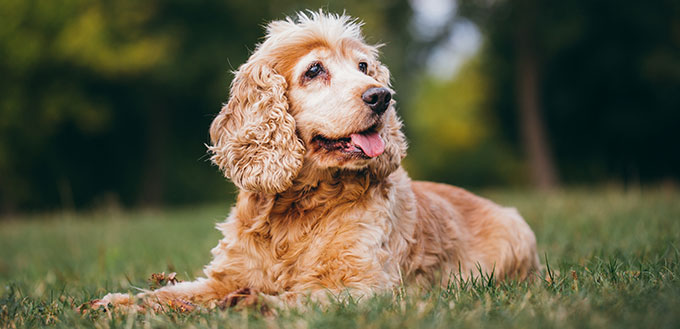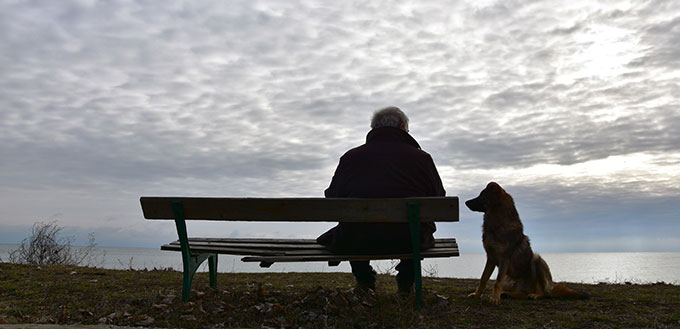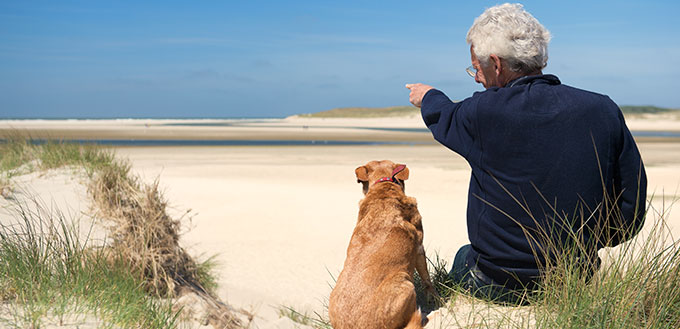We all want our fur babies to be comfortable in their old age, which is why senior dog care is absolutely essential. With old age comes a unique set of challenges. Older pets often experience struggles with their joints, memory loss, sight problems, digestion trouble, sleeping difficulty, and hearing loss. Caring for your senior dog can feel like a daunting task, but with the right research and care, it is easier than you think. That’s why we’ve compiled a list of tips to ensure your senior dog feels like a young, hip puppy again.
When Is my Dog Considered a Senior?
When your dog is considered a senior depends on their breed, as dog ages vary quite dramatically. For example, a Great Dane is expected to live 8-10 years, but a Chihuahua can live from 15-20 years. Generally speaking, most dogs are considered seniors when they reach 10-12 years of age.
You can start to recognize old age in dogs with the classic arrival of gray hair. Senior dogs show their age when their muzzles begin to gray. You also know your dog better than anybody else and should recognize signs of them being less active, having difficulty getting on and off the couch, and finding long walks harder to complete.
Ways to Help Senior Dogs Feel Younger
Looking for a few tips on how to cope with an old dog? Here are the best things you can do on a day-to-day basis to help keep your old dog feeling fit. Don’t let gray hairs and tired limbs get in the way of them still having a good time!
Watch Their Diet
A nutritious diet is key to keeping your dog’s body running smoothly, especially in their old age. Bad nutrition can result in severe health problems, such as kidney, liver, and heart disease, weight gain, and diabetes. If a dog’s diet isn’t right for their current needs, they can begin to gain weight as their metabolism slows down. This will put more pressure on their joints, resulting in arthritis and other joint difficulties. Joint problems also affect their movement and ability to get the appropriate amount of exercise. Clearly, bad diet can create a vicious cycle that is difficult to break out of. It is best to avoid these issues from the get-go by simply providing your dog with a healthy diet.
Every senior dog needs good senior targeted food that are rich in omega fatty acids. These acids help with joint care and prevent arthritis from developing. The high protein levels are good for muscle recovery, which may not be something you would consider with less active and older pets. Moving around is more difficult for them, and so the exercise they do get can take its toll on their bodies. This is where the high protein food comes in. For more options, check out our detailed review of senior dog food.
Supplements
It also can’t hurt to throw in a few good senior supplements to boost their health. By adding supplements to their diet, you are boosting their cardiovascular system, digestion, joints, skin, and general health with a dense supply of multivitamins and minerals. Contact your vet for more specifics on which supplements would be best for your dog.
Keep Them Exercising
It is easy to assume that they no longer need exercise, now that they’re older. However, that is precisely why you need to encourage it! No need to start agility training or force them to run multiple laps around the house. Simply get them up and moving around. Also, you get to determine how much you think they can do, based on how active they were when they were younger. If they’re struggling with an injury or arthritis that affects their movement, then maybe a few laps around the yard is enough. On the other hand, they may be in better health and could handle a trip to the neighborhood park. Maybe you could get away with a game of fetch! It’s your call. You don’t want to push your dog too much.
Keeping Them Limber
Regular exercise is extremely important to add to your senior dog care routine. It helps to increase blood flow, keep them limber and strong, and moderate their weight. Exercise also reduces aches and pains that they may have as a result of reduced mobility. Surely you’ve noticed also that when you stay still for too long, you can become stiff and sore? It is the same for your pup! Getting them to move around gives them that chance to stretch and warm up.
Mental Stimulation for Older Pets
Aging dog care doesn’t always have to be about keeping their bodies in check. It is just as important to keep their minds active. By providing your older dog with the mental stimulation they need, you are keeping their minds focused and sharp. Senior dogs have a harder time staying interested in things that once were their life, so it’s best to keep them engaged with new things.
Teach Your Old Dog a New Trick
The best way to keep their attention is to simply give them something new to engage with. You’ll be teaching your old dog new tricks in no time! If your senior dog is showing less interest in their toys, you can actively encourage their focus by finding a new trick to teach them. We recommend keeping the new trick simple. Something like “paw” or “lie down”, as your older dog may not be as limber as they used to be. A trick such as, “rollover”, could be too difficult for them. Remember, short lessons with plenty of positive reinforcement!
Here’s why a new trick is great for an elderly dog. It not only supports their cognitive function and holds their attention, but it also keeps them moving. Furthermore, new tricks change up their routine for the better and provide them with some of that much-loved time with their human family. Don’t forget to exercise patience! Your older dog may not learn as quickly as they once did. Plus, their hearing could have faded a bit. You might have to speak up when giving commands!
Look After Their Teeth
Dental disease can, unfortunately, be common among senior dogs. If you have not kept up with their dental care over the years, then they can begin to show signs of gum disease, tooth decay, tooth loss, or even infection. Any of these issues will certainly cause them pain and discomfort! When caring for your older dogs’ teeth, start by calling your veterinarian. Once an appointment is booked, they can assess what steps you may need to take to protect your dog’s teeth for the rest of their future.
How to Care For Your Older Dog’s Teeth
Older dogs may be more sensitive when it comes to their teeth. All the more reason to find a way to care for them! If your veterinarian has advised that it is okay to do so, brush your dog’s teeth as much as possible. Just like with our own daily bathroom routine, brushing a dog’s teeth is a good way to avoid future health problems. Fortunately, this doesn’t have to be expensive. You can find a variety of homemade dog toothpaste recipes that will do the job brilliantly. Additionally, you can purchase toothbrushes for dogs online that are made for the job. Here are a few alternative options:
- Dental Toys
- Dog Dental Sprays
- Professional Cleaning
- Dental Treats and Chews
While these options seem simpler, try to brush your dog’s teeth as often as you can. It is the best cleaning method to avoid dental disease, after all! Moreover, don’t be afraid to contact your veterinarian for questions and concerns.
Make Them Comfortable
An older dog may need to keep moving, but just as important is getting them a comfortable place to rest at the end of the day. Senior dogs experiencing joint difficulties may also suffer from fitful sleep, if they are not comfy enough. These dogs will also need a secluded space that is all their own, so they are less likely to feel disturbed.
There is a wide range of dog beds made specifically with your dog’s comfort in mind. As senior pets typically require orthopedic support, this means picking the right bed is also very important. Some dog beds offer compatible additions like heated dog pads, which are great for soothing sore joints and muscles. Your dog’s body will thank you for going the extra mile to make sure they have a restful place to relax!
Take a look at our review of the Best Orthopedic Dog Bed.
Keep in Touch With Your Vet
If your older dog is acting in a way that gives you cause for concern, don’t hesitate to contact your veterinarian for help. Senior pets often express their discomfort in more obvious, aggressive ways, so it is easier to tell when they are having a problem. Make sure to keep in touch with your vet about these various behavioral issues. To better tell if your dog is acting this way, here are some common causes that point to irritable behavior:
- Pain: If they are struggling with severe pain, they can become defensive.
- Stressed: When they are unable to settle due to cases of severe stress, they may lash out unexpectedly.
- Anxiety: Anxiety is regularly seen in dogs that struggle with their hearing, sight, or other mental health issues such as dementia. They are unable to focus or make sense of the world, which can make them feel afraid and uncertain.
Other behavioral changes that are reason enough to contact your vet include:
- Reduced Appetite or Drinking.
- Confusion – Unable to come when called, appearing lost, pacing around the house.
- Accidents, such as soiling the house.
- Lethargy – Not engaging and excessive sleeping.
Your veterinarian is there to help you through all the stages in your dog’s life. As they are aging, their body may start to act up. Additional help becomes all the more important. Senior dog care is tough, but with the right support, you and your dog won’t feel so alone in the process.
Quality Time
When it comes down to it, aging is a natural process for every creature. Your dog is no different! All they really want is to spend some good, quality time with their favorite human. That means you! So go play, cuddle, or simply sit with them. Remember to show them the same love and excitement as you did when they were tiny pups. After all, they’re still the same fur baby you adopted all those years ago. Help them enjoy their last years by reminding them of those little, sweet moments that really count.
Source:
- Dr. Marty Becker, Loving an Older Pet, AARP
- Behavior Problems in Older Dogs, ASPCA
- Senior Dog Care: Caring for Older Dogs, Best Friends Animal Society
Note: The advice provided in this post is intended for informational purposes and does not constitute medical advice regarding pets. For an accurate diagnosis of your pet's condition, please make an appointment with your vet.










